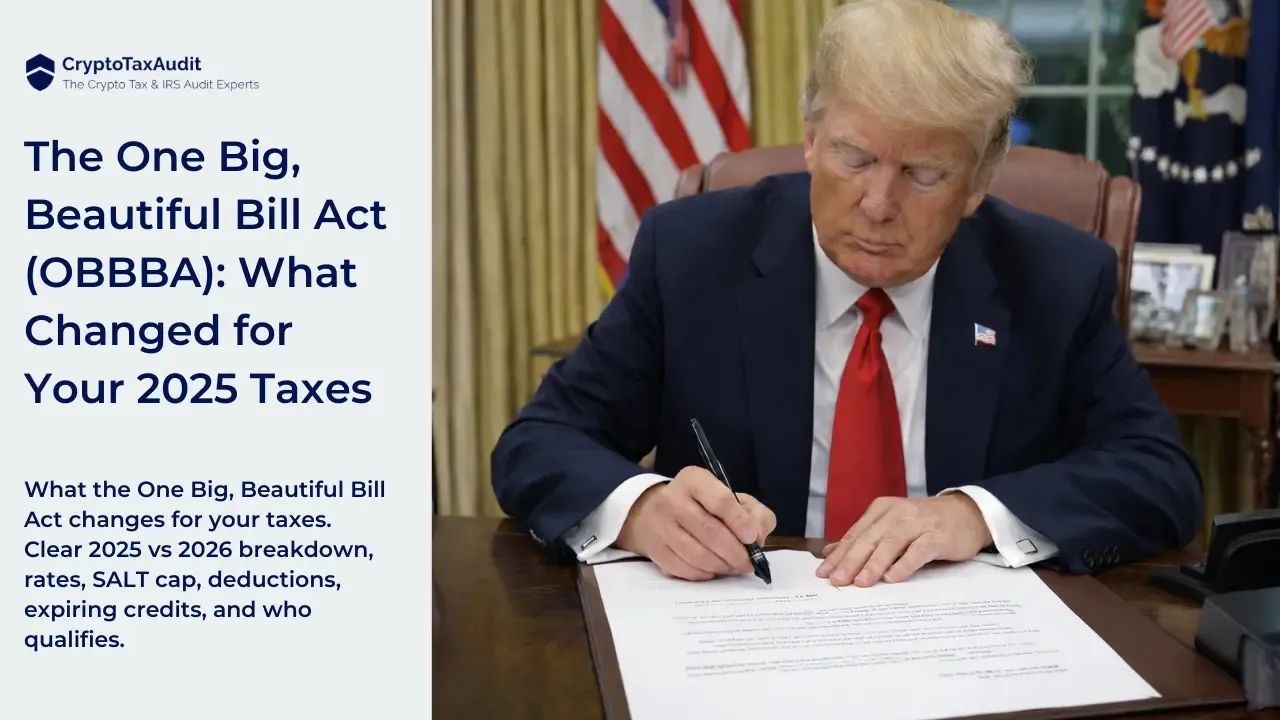
Roger Ver’s Tax Charges Break Down the Real Risks of Renouncing with Bitcoin
Key Takeaways:
-
Roger Ver isn’t charged with crypto-specific crimes—it’s traditional tax law violations involving undeclared assets.
-
The IRS exit tax applies to all high-value assets upon renunciation—including Bitcoin.
-
This case shows the IRS treats crypto like any other asset class when enforcing tax law.
-
CryptoTaxAudit helps defend against IRS scrutiny, especially in complex cases like expatriation or business holdings.
Roger Ver—once dubbed “Bitcoin Jesus”—isn’t making headlines for evangelizing adoption anymore.
Instead, his name is tied to a $48M tax evasion case that exposes a crucial truth: crypto isn’t immune from traditional tax law.
While the case has sparked a whirlwind of speculation, let’s cut through the noise and break down what’s actually happening.
The Charges Against Roger Ver: Not About Crypto Taxes
Despite what some might assume, Roger Ver isn't being prosecuted simply for failing to pay cryptocurrency taxes.
The case is much more nuanced, involving longstanding tax laws that apply to all assets—not just Bitcoin.
1. The Exit Tax and Undeclared Bitcoin Holdings
- In 2014, Ver renounced his U.S. citizenship.
- Under U.S. tax law, individuals who expatriate and have assets exceeding $2 million are subject to an exit tax, typically around 40% on assets beyond the threshold.
- According to the U.S. government, Ver failed to report 200,000 BTC he personally held at the time.
- Even though Bitcoin's price in 2014 was significantly lower, this holding easily surpassed the $2 million mark, triggering exit tax obligations.
- The issue? He did not declare these assets as required.
2. Undeclared U.S. Company Assets (2017-2018)
- In 2017 and 2018, Ver controlled two U.S.-based companies that transferred several hundred BTC to him.
- These company assets were subject to regular U.S. tax laws, regardless of the Bitcoin connection.
- The government alleges he failed to declare these assets, constituting another tax violation.
Is This Really a Case of Targeting Crypto?
A common misconception is that this case is about cryptocurrency taxation. But the reality is different:
- The core issue isn’t that Ver avoided crypto-specific taxes—it’s that he allegedly failed to comply with standard tax reporting laws that apply to all assets.
- If the government’s claims are accurate, his failure to report any high-value asset (whether Bitcoin, stocks, or real estate) during expatriation would have resulted in the same charges.
- Just because Bitcoin is involved doesn’t mean this is about crypto taxation. These are traditional tax violations being applied to digital assets.
Should Roger Ver Be Pardoned?
Roger Ver is arguing for a pardon, claiming that he has been unfairly targeted. But consider the implications:
- If he were granted clemency, it would set a precedent where anyone who paid an exit tax could demand forgiveness.
- Tax laws exist to ensure fairness—renouncing U.S. citizenship doesn’t mean renouncing tax responsibilities.
- The government has presented a compelling case that suggests Ver knowingly avoided his tax obligations.
While Ver may still have legal defenses, his plea to Trump isn’t based on a claim of innocence—it’s a request for mercy.
Final Thoughts: The Bigger Picture
This case isn’t just about Roger Ver; it’s a reminder that crypto wealth is subject to the same tax rules as any other asset.
Whether you're a retail trader or an industry pioneer, tax compliance is non-negotiable.
Protect Yourself with CryptoTaxAudit – Beyond Filing, We Defend You
At CryptoTaxAudit, we do more than just file your taxes—we protect you from IRS scrutiny. Most crypto tax services stop at calculations, but when the IRS starts asking questions, we step in to defend you.
Whether you’re dealing with complex tax situations—expatriation, business holdings, DeFi trades, or large Bitcoin transactions—our team ensures you're compliant, audit-ready, and IRS-proof.
💼 Don’t wait until the IRS comes knocking. Secure your portfolio today—schedule a call now and get protected. 🔥
Want the audio version? Click here to watch the narrated blog on YouTube.
Related Articles: Why Crypto Traders NEED CryptoTaxAudit Defense Before It’s Too Late
FAQs
Q: Was Roger Ver charged for not paying crypto taxes?
A: No. The charges relate to undeclared assets and exit tax violations—Bitcoin just happens to be the asset involved.
Q: What is the IRS exit tax?
A: It’s a tax assessed on U.S. citizens with over $2M in assets who renounce their citizenship. It applies to all asset types, including Bitcoin.
Q: Is this a crypto-targeted case?
A: Not specifically. The same charges could have applied if Ver failed to report high-value real estate or stocks. The issue is non-disclosure, not Bitcoin.
Q: Could a pardon for Roger Ver change how exit taxes work?
A: It might set a precedent that undermines exit tax enforcement, making it harder for the IRS to hold expatriates accountable in future cases.
Q: How can I avoid similar IRS issues?
A: By reporting all assets correctly during expatriation and working with experts like CryptoTaxAudit, if you're considering renouncing or have complex holdings.





